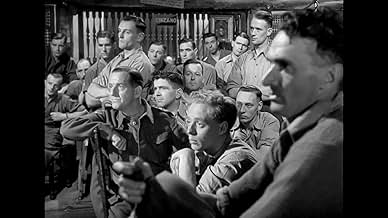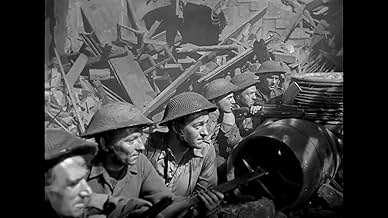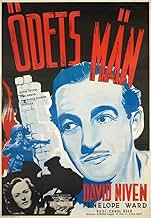AVALIAÇÃO DA IMDb
6,9/10
2,4 mil
SUA AVALIAÇÃO
Drama da Segunda Guerra Mundial que acompanha um grupo de recrutas britânicos, começando com seu rigoroso treinamento básico e terminando com sua mobilização no Norte da África.Drama da Segunda Guerra Mundial que acompanha um grupo de recrutas britânicos, começando com seu rigoroso treinamento básico e terminando com sua mobilização no Norte da África.Drama da Segunda Guerra Mundial que acompanha um grupo de recrutas britânicos, começando com seu rigoroso treinamento básico e terminando com sua mobilização no Norte da África.
- Direção
- Roteiristas
- Artistas
- Prêmios
- 1 vitória no total
Hugh Burden
- Pte. Bill Parsons
- (as Hugh Burdon)
Jimmy Hanley
- Pte. Geoffrey Stainer
- (as Jimmie Hanley)
William Hartnell
- Sgt. Ned Fletcher
- (as Billy Hartnell)
A. Bromley Davenport
- Chelsea Pensioner
- (as Bromley Davenport)
Renée Asherson
- Marjorie Gillingham
- (as Renee Ascherson)
Avaliações em destaque
"The Way Ahead" is an interesting film produced in Britain during World War II to support the war effort by drawing on the talents of an outstanding group of noted British personalities, including Erik Ambler, Carol Reed, Peter Ustinov. The actors comprise and ensemble of some of the most recognizable British character actors of the 1940s and 1950s, not least among whom are David Niven and Peter Ustinov, who actually were serving in the British Army at the time.
The plot follows a polyglot assortment of civilians who are drafted into the British Army at the Beginning of World War II, undergo basic training and eventually emerge as an efficient fighting unit. It is not a new story but it is done very well in this case, thanks to excellent writing and direction, and the equally expert ensemble cast.
However, I must admit that I have only seen this film in the United States under it's alternative title, "the Immortal Battalion". I could not help coming away with the suspicion that the original film must have been somewhat cut and reedited before release in the U.S. I don't know for a fact if that was the case, but certain hints here and there in the story line, as well as certain odd gaps in continuity, suggest that may have been the case. I find it difficult to believe that Erik Amber, Peter Ustinov and Carol Reed would have been satisfied with such clumsiness of production, so I can only assume that the film must have been clumsily reedited later by somebody else. For that reason, I find it difficult to judge this film fairly without comparing it with the original UK version, which I strongly suspect differs somewhat from the version shown in the U.S. Nevertheless, I still recommended it highly.
The plot follows a polyglot assortment of civilians who are drafted into the British Army at the Beginning of World War II, undergo basic training and eventually emerge as an efficient fighting unit. It is not a new story but it is done very well in this case, thanks to excellent writing and direction, and the equally expert ensemble cast.
However, I must admit that I have only seen this film in the United States under it's alternative title, "the Immortal Battalion". I could not help coming away with the suspicion that the original film must have been somewhat cut and reedited before release in the U.S. I don't know for a fact if that was the case, but certain hints here and there in the story line, as well as certain odd gaps in continuity, suggest that may have been the case. I find it difficult to believe that Erik Amber, Peter Ustinov and Carol Reed would have been satisfied with such clumsiness of production, so I can only assume that the film must have been clumsily reedited later by somebody else. For that reason, I find it difficult to judge this film fairly without comparing it with the original UK version, which I strongly suspect differs somewhat from the version shown in the U.S. Nevertheless, I still recommended it highly.
It's long but it's good. For a British film from 1944 the production values are amazingly high. Whole buildings -- real ones -- collapse. The special effects at sea are convincing. And what a cast!
Actually, the story itself is hardly new. A diverse group of men are drafted into the Duke of Glendons, go through a training camp periods, their transport is torpedoed, and they fight a small-scale defensive battle among the ruins of a village in North Africa. Writers Eric Ambler and Peter Ustinov have whipped it into entertaining shape.
None of the men is regular army except the tough sergeant who has eyes like a lizard but the heart of a Rogerian therapist. David Niven has risen from the ranks and is a lieutenant. The men themselves, with their winsome misapprehensions, are brought into a state of readiness by a combination of strict physical demands and compassion. The leaders are stern but fair. I won't bother describing the draftees because you can already guess their nature from a dozen other war movies -- the grumbler, the show-off, the snob, the Welshman, the earnest patriot.
If you didn't know that it was directed by Carol Reed, you'd still probably notice some unusual directorial touches. A sleepy backwater little town. An old man, half asleep, brushing the flies from his face. A dog sleeping in the street. And then the distant sound of motorcycles and bren carriers growing louder. And soon a stream of British vehicles lumbering loudly through the main street and stirring the dust, with the dog lazily moping away and a disheveled Peter Ustinov emerging from the Cafe Rispoli to stare sullenly at the pageant.
It may or may not sound promising in a synopsis but in fact it's pretty good.
Actually, the story itself is hardly new. A diverse group of men are drafted into the Duke of Glendons, go through a training camp periods, their transport is torpedoed, and they fight a small-scale defensive battle among the ruins of a village in North Africa. Writers Eric Ambler and Peter Ustinov have whipped it into entertaining shape.
None of the men is regular army except the tough sergeant who has eyes like a lizard but the heart of a Rogerian therapist. David Niven has risen from the ranks and is a lieutenant. The men themselves, with their winsome misapprehensions, are brought into a state of readiness by a combination of strict physical demands and compassion. The leaders are stern but fair. I won't bother describing the draftees because you can already guess their nature from a dozen other war movies -- the grumbler, the show-off, the snob, the Welshman, the earnest patriot.
If you didn't know that it was directed by Carol Reed, you'd still probably notice some unusual directorial touches. A sleepy backwater little town. An old man, half asleep, brushing the flies from his face. A dog sleeping in the street. And then the distant sound of motorcycles and bren carriers growing louder. And soon a stream of British vehicles lumbering loudly through the main street and stirring the dust, with the dog lazily moping away and a disheveled Peter Ustinov emerging from the Cafe Rispoli to stare sullenly at the pageant.
It may or may not sound promising in a synopsis but in fact it's pretty good.
THE WAY AHEAD is to some extent a cliche-driven movie, but given the timeframe of its production, I feel it portrays very well the mindset of the ordinary citizen of a country under extreme duress, as well as the tribulations of the many regiments being reconstituted as the war progressed seemingly forever. While it is difficult for us to imagine what it must have been like to live under the constant spectre of loss and possible defeat, even some understanding of the way things were for the British in 1944 will permit a casual viewer of THE WAY AHEAD to appreciate its positive message and the call-to-duty which it implies.
When compared against many of the similar American WW2 'propaganda' films, THE WAY AHEAD comes across as a down-to-earth story which I'm sure many could identify with at the time. For us, the 21st-century viewer, this movie is a welcome glimpse of the British perspective back then, unique in both plot and characterization compared to the more common U.S. fare of the period. In addition, it provides the enthusiast with dozens of rare snapshots of the use of unique British Commonwealth WW2 equipment.
When compared against many of the similar American WW2 'propaganda' films, THE WAY AHEAD comes across as a down-to-earth story which I'm sure many could identify with at the time. For us, the 21st-century viewer, this movie is a welcome glimpse of the British perspective back then, unique in both plot and characterization compared to the more common U.S. fare of the period. In addition, it provides the enthusiast with dozens of rare snapshots of the use of unique British Commonwealth WW2 equipment.
A film that despite being made in 1944, avoids sterotyping British Characters. A story about a group of people, from various civilian jobs, who receive their call-up papers. It shows them progressing through their training and entering action in North Africa.
The version of The Way Ahead that I have is one that was edited for the American market and has a narration by US war correspondent Quentin Reynolds. It was his narration that sets the stage for a wartime tribute to the civilians who volunteered for king and country at a time of their nation's greatest peril.
When war in Europe was declared David Niven was one of the British stars in America that went back to serve. Since he had been in the army before taking up acting, he was able to secure a commission. For a good deal of the war he was a training officer and really was drilling the men as we see on Salisbury plain. Some of his time was spent in the commandos in missions to Europe. And he was released to make wartime films Spitfire and The Way Ahead.
The script was written by a 21 year old actor/playwright named Peter Ustinov who has a small role in the film. According to a new biography of Niven in order to secure Ustinov's service, enlisted man Ustinov was attached to officer Niven as his orderly.
A whole lot of faces familiar in the British cinema appeared in The Way Ahead, people like Stanley Holloway, Jimmy Hanley, James Donald, Leo Genn, and Trevor Howard. And it was directed in good style by Carol Reed, one of his earliest films.
One big flaw in the film was that the men who trained with officer Niven and sergeant William Hartnell ended up serving with him in North Africa. Not possible in America and not possible in the UK either. But since the idea was to show camaraderie, I guess that Two Cities Films can be forgiven.
The point of the film and of Quentin Reynolds narration is that in time of peril it is the democracies and not those totalitarian countries with a superman philosophy who have the real strength of character. May it ever be so.
When war in Europe was declared David Niven was one of the British stars in America that went back to serve. Since he had been in the army before taking up acting, he was able to secure a commission. For a good deal of the war he was a training officer and really was drilling the men as we see on Salisbury plain. Some of his time was spent in the commandos in missions to Europe. And he was released to make wartime films Spitfire and The Way Ahead.
The script was written by a 21 year old actor/playwright named Peter Ustinov who has a small role in the film. According to a new biography of Niven in order to secure Ustinov's service, enlisted man Ustinov was attached to officer Niven as his orderly.
A whole lot of faces familiar in the British cinema appeared in The Way Ahead, people like Stanley Holloway, Jimmy Hanley, James Donald, Leo Genn, and Trevor Howard. And it was directed in good style by Carol Reed, one of his earliest films.
One big flaw in the film was that the men who trained with officer Niven and sergeant William Hartnell ended up serving with him in North Africa. Not possible in America and not possible in the UK either. But since the idea was to show camaraderie, I guess that Two Cities Films can be forgiven.
The point of the film and of Quentin Reynolds narration is that in time of peril it is the democracies and not those totalitarian countries with a superman philosophy who have the real strength of character. May it ever be so.
Você sabia?
- CuriosidadesIn the U.K., this was released on D-Day, June 6, 1944.
- Erros de gravaçãoFollowing some energetic army training, Private Bill Parsons is seen sitting on the grass at the top of a cliff, with his colleagues, exhausted. However, the action then cuts to him being helped up the cliff.
- Citações
Pvt. Ted Brewer: Only one good man ever got into Parliament.
Pvt. Herbert Davenport: Oh really? Who?
Pvt. Ted Brewer: Bleedin' Guy Fawkes.
- Cenas durante ou pós-créditosThe film ends with THE BEGINNING
- Versões alternativasThe version seen on American TV under the alternate title "The Immortal Battalion" has been re-edited and extensively cut (from 115 to 91 or 86 minutes) by Ed Fitz with an added preface and epilogue by war correspondent Quentin Reynolds.
- ConexõesEdited into WW II Theater: The Way Ahead (2022)
- Trilhas sonorasIf You Were the Only Girl (in the World)
(uncredited)
Written by Nat Ayer
Lyrics by Clifford Grey
Performed by Tessie O'Shea and soldiers
Principais escolhas
Faça login para avaliar e ver a lista de recomendações personalizadas
- How long is The Way Ahead?Fornecido pela Alexa
Detalhes
- Tempo de duração
- 1 h 55 min(115 min)
- Cor
- Proporção
- 1.37 : 1
Contribua para esta página
Sugerir uma alteração ou adicionar conteúdo ausente























